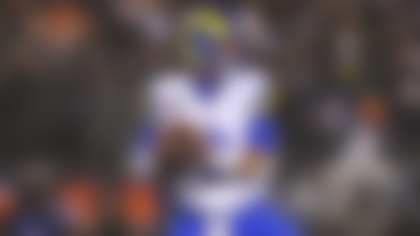Week 6 had several surprising wins on Sunday. Here are some of our big takeaways:
»Adrian Peterson looked good. Really good.
»With Aaron Rodgers fracturing his collarbone, the NFC North is wide open for the remaining 10 games.
» Baltimore's offense is a mess. The Ravens converted 3 of 18 third downs on the day.
» The 49ers have a new starting quarterback: third-round pick C.J. Beathard.
» The Giants should stick to offensive coordinator Mike Sullivan for play-calling duties.
- Adrian Peterson's rumored demise amounted to pure rubbish. On his first drive as a member of the Cardinals, Arizona's newly minted featured back rumbled for 54 yards off four carries, capped by Peterson's hard-charging, 27-yard touchdown gallop. After a month of uninspiring play in New Orleans, Peterson -- acquired this week for a conditional 2018 sixth-round pick -- ran with power and speed, looking fresh as he blasted his way through Tampa's front seven for 134 yards and two scores at a healthy 5.2 yards per carry. That doesn't include a 41-yard burst that was nullified by penalty.
- We can't say enough about Peterson's effect on this offense, which piled up 300-plus yards over the first 30 minutes of play. The worst rushing attack in the NFL looks completely reborn, a dynamic that helped Carson Palmer stay upright and author a marvelous first half. With Peterson bringing newfound legitimacy on play-action snaps, Palmer completed his first 14 throws and lit up Tampa's secondary with 283 yards and three touchdowns on the day. His chemistry with Larry Fitzgerald (10/138/1) was a thing of beauty, with the future Hall of Fame receiver crossing the 100-yard barrier in just over a quarter. It was concerning to see the offense go to sleep in the second half, but Arizona is suddenly a factor again in the NFC West.
- Bucs starting quarterback Jameis Winston was ruled doubtful to return after suffering an injury to his throwing shoulder, the result of being slammed to the ground by pass-rusher Chandler Jones. Backup Ryan Fitzpatrick deserves a load of credit for his handwork, as the wily vet directed four scoring drives after the break. Tampa's defense also triggered a second-half touchdown return off a Fitzgerald catch and fumble, which slimmed Arizona's lead to 31-20. The comeback bid aside, Tampa (2-3) exits Week 6 facing a flock of questions about their playoff potential.
-- Marc Sessler
- The NFL universe can be a series of macabre events for a struggling quarterback like Ben Roethlisberger, who was still recovering from the worst game of his career last week against Jacksonville. But sometimes...sometimes on a third-and-2 with your team clinging to a slender lead against the best team in football, you buzz an ill-advised pass into double coverage and the cornerback with the best chance to make a play turns on the ball, has it bounce off his hands and into the arm of Antonio Brown. Then Brown takes the ball 51 yards for a score. It was Roethlisberger's first touchdown pass since the second quarter of an Oct. 1 win over the Baltimore Ravens.
- And even then, you need help from your fantastic defense. The Chiefs had a chance to win, down just six points on their final drive. Alex Smith got the ball past midfield before the league's ultimate closer, the situationally used James Harrison, burned around tackle Eric Fisher and planted Alex Smith into the ground. The sack forced a fourth-and-18 and, eventually, the victory formation for Pittsburgh.
- This was a stunning defensive effort by the Pittsburgh Steelers who, at the four minute mark in the third quarter, had surrendered just 25 total yards of offense to the Chiefs. Had it not been for Kareem Hunt taking a desperation Smith pass and rugby sprinting through tackles on his way down the field at the end of the third quarter, that number might have stayed the same through the final whistle. Pittsburgh clamped down on a crucial fourth-and-goal at the beginning of the fourth quarter to end that Hunt drive. For the first time all season, Alex Smith looked human. He was constantly on the run from what seemed like a relentless stretch of free-rushing Steelers blitzers. Kansas City was forced to be a common, block-and-tackle NFL offense, which doesn't suit their personnel much.
-- Conor Orr
- Connor Barth drilled a 40-yard field goal in overtime as the Bears escaped Baltimore after giving up an 11-point fourth-quarter lead. For much of the game, Bears coach John Fox saw his dream come to life on the field. His defense smothered a struggling Ravens offense, forcing three turnovers. His running game pounded Baltimore on the ground. And his young quarterback overcame mistakes and growing pains to make one beautiful touchdown pass on the move and a huge completion on third down in overtime to set up the game-winning FG. The Bears rode Jordan Howard 36 times for 167 yards, often gashing Baltimore up the gut. Howard's 40-yard dash in overtime put the Bears in position to win. Mitchell Trubisky played shaky for most of the game. Asked to sit in the pocket more this week, he completed 8 of 16 passes for 113 yards, threw one touchdown, took four sacks, and fumbled. With such limited played experience, we expect struggles from the rookie. His pocket movement on the game-winning pass, however, displayed the type of dynamic ability he possesses when it all clicks.
- Baltimore's offense is a mess. Joe Flacco was inaccurate most of the afternoon and completed almost nothing downfield -- his longest pass play going 17 yards. Running back Alex Collins popped a few long runs, but the dink-and-dunk offense couldn't move the chains. The Ravens converted 3 of 18 third downs on the day. Flacco had little help from his receivers who struggle to get separation and had two balls tipped away for interceptions. Breshad Perriman also exited with a concussion and didn't return. When Baltimore did move the ball, the Ravens either faltered in the red zone or turned the ball over. If it weren't for two special teams touchdowns, this game would have ended in a double-digit home loss for Baltimore. Barring a change in philosophy (a.k.a. Marty Mornhinweg's seat being hot) there isn't a lot of hope for an offensive outburst from the current collection of talent in the Charm City.
- Chicago's trickery with Trubisky under center continues. Late in the second quarter following an interception, Bears running back Tarik Cohen took a pitch running right and lobbed a pass to tight end Zach Miller for a 21-yard touchdown. For the second straight game, a non-QB tossed a TD pass for Chicago (punter Pat O'Donnell in Week 5). Cohen became the first Bears running back to throw a TD pass since Adrian Peterson (not that one) in 2007, per NFL Research. He was also the first Bears rookie RB to toss a TD since Gale Sayers in 1965. If those accolades weren't enough, Cohen became the first person 5-foot-6 or shorter to throw a TD pass since Wee Willie Smith in 1934 for the Giants (also 5-foot-6).
-- Kevin Patra
- With 8:31 to go in the fourth quarter, a seemingly routine 4-yard Austin Seferian-Jenkins touchdown was reviewed and overturned, cementing a decision from the NFL's team of replay officials that will be discussed all week long. Jenkins, who appeared to momentarily bobble the football en route to the ground, was said to have fumbled the ball out of bounds in the end zone resulting in a touchback.
The masses did not seem to agree. CBS color analyst Dan Fouts called it "one of the strangest decisions on a call like that I've ever seen," while Fox analyst Mike Pereira, the league's former officiating head, said on Twitter there "does not seem like enough evidence to change the ruling." Seferian-Jenkins was in disbelief and ran toward the officiating crew after the call was made. A shot of him sitting perplexed on the sidelines was a mainstay throughout the remaining broadcast.
"From my angle and reply I didn't see the ball fumble," Jets coach Todd Bowles said after the game. "So, I saw it bobble and I saw green gain control of it and go from there."
- The Jets settled for a field goal and still had a chance to tie the game. With less than a minute to play, Josh McCown converted a fourth-and-12 to Robby Anderson on a crossing route that produced 32 yards. While the drive was eventually tamped out thanks to zero Jets timeouts and a momentarily effective Patriots pass rush, it was indicative of the Jets' scrappiness. McCown and Co. held a 14-point lead in the first half which, according to ESPN stats, was the first 14-point lead the Jets have had over the Patriots in the opening half since 2008. They identified a potential mismatch between Anderson and Malcolm Butler and were not afraid of attempting deep passes throughout the afternoon.
- How did the Jets take the Patriots to the limit? While there was a memorable pass interference call on Rob Gronkowski, it seemed the officials were allowing a greater range of physicality from the defensive backs. This aided the Jets, who went after Gronkowski (six catches for 83 yards and two touchdowns) with both star rookie safety Jamal Adams and Kony Ealy at the line. The Patriots were also flagged multiple times for "pick" plays.
-- Conor Orr
- Sporting a fully healthy offensive line for the first time all season, the Packers' afternoon started with a tremendous sense of optimism. By the start of the fourth quarter, Aaron Rodgers' season was in jeopardy with a fractured collarbone and the offensive line was missing both starting tackles as well as versatile guard Lane Taylor. Standing behind the depleted front line, backup quarterback Brett Hundley was pressured on over half of his dropbacks and failed to manufacture offense in the face of the Vikings' fearsome pass rush. A week ago, the Packers were riding high as NFC Super Bowl favorites coming off a thrilling come-from-behind victory at Dallas. Now they return home to lick their wounds in advance of a Week 7 clash with a white-hot Saints team before the Week 8 bye offers a welcomed respite.
- The snakebit Packers will get little sympathy from a Vikings outfit lining up without starting quarterback Sam Bradford (knee), hotshot rookie tailback Dalvin Cook (torn ACL) and No. 1 receiver Stefon Diggs (groin). Whereas Hundley disappointed in his first shot at extended NFL action, Case Keenum has been a godsend in Minnesota. The trusty backup downshifted to game-manager mode Sunday, protecting the ball and utilizing Jerick McKinnon (98 yards, two touchdowns) and Adam Thielen (nine catches, 97 yards) as chain movers. Although Teddy Bridgewater is headed for a key checkup and physical on Monday to gain clearance for a return to practice, it's foolish to assume he will immediately unseat Keenum for QB1 duties in Bradford's absence.
- Rodgers' injury leaves the NFC North wide open for the remaining 10 games. Even with the bandaids to their offense, the Vikings have to be considered the new favorites due to a stingy defense led by Pro Bowl safety Harrison Smith and the ferocious pass-rushing tandem of Everson Griffen and Danielle Hunter. Smith had an extraordinary week, notching 1.5 sacks and a spectacular diving interception Sunday, six days after sealing the Monday night victory with an instinctual interception of Bears rookie Mitchell Trubisky.
-- Chris Wesseling
- The score looks familiar. The profile of this Saints team is not. Defensive end Cameron Jordan's batted pass and pick-six interception late in the fourth quarter was a fitting clinching moment in a game that could not have been wilder. The Saints' defense harassed Lions quarterback Matthew Stafford into five turnovers, tallied five sacks and somehow batted 12 passes at the line of scrimmage, only two from the NFL record. Jordan is having the best season of his underrated career, with two more sacks, two tackles for loss and three passes defensed on the day. The Saints' defense did a fine job despite the score, allowing only 18 first downs in 17 drives. New Orleans' defense gave up 24 points and scored 21 on their own.
- So how did the score get so crazy without that much offense? The Saints' defense scored three touchdowns, while the Lions' defense scored one and punt returner Jamal Agnew scored another during a wild fourth quarter. After trailing 45-10 midway through the third quarter, the Lions came all the way back to make it 45-38 with the ball in the fourth quarter before Jordan's interception.
- This game could not have gone much worse for the Lions. Stafford was only able to take snaps out of the shotgun because of his injured ankle, then took a beating throughout. The Lions lost safety Glover Quinn (concussion), wide receiver Golden Tate (shoulder) and tackle Greg Robinson (ankle) to injury. Now 3-3 after a fast start, the team was steamrolled on the ground early and lacks its old explosion on offense.
-- Gregg Rosenthal
- The Rams are 4-2. The Rams are 4-2!! Who'd have thought, at the end of 2016's miserable campaign, that we'd be stating this fact after six weeks? Los Angeles has found a way to combine a run-first offense on the back of Todd Gurley, branch out from there in an offense that is much more comfortable for second-year passer Jared Goff, and rely on its defense to do the rest. We got an extra wrinkle that proved to be a huge point in the game when the Rams' punt return unit pinched and overloaded a gap, with Cory Littleton breaking through for a textbook punt block recovered by Malcolm Brown, who was surrounded by a mob of Rams and pulled into the end zone for a touchdown. It brought a new meaning to the Mob Squad slogan the Rams have been riding for the last few years.
- The Jaguars (3-3) have taken the Jekyll and Hyde approach early in the season, but make no mistake -- this is a statement win for the Rams. Los Angeles got off to the quickest start possible, with Pharoh Cooper taking the opening kick 103 yards for a touchdown, and then had to weather an immediate response -- Leonard Fournette's 75-yard sprint to pay dirt -- 11 seconds later. The Rams did just that, riding Gurley (23 attempts, 116 yards rushing) and heady play from Jared Goff (11-of-21 passing, 124 yards, one touchdown) to a 24-14 lead into halftime and holding onto it with a vice grip in a grind-it-out second half. In an uninviting environment (with a questionable playing field) against a tenacious Jaguars defense, the Rams exited unscathed and with their fourth victory in six games. Quite a start for Sean McVay.
- A game that was bursting with points screeched to a halt in the second half, thanks to halftime adjustments made by two of the league's stronger defenses and a flurry of turnovers. Calais Campbell was again the star of Jacksonville's unit, with his second sack forcing Los Angeles into a third-and-long that essentially stopped cold a promising drive after a Jason Myers field goal cut the Rams' lead to seven. Not to be outdone, L.A. defensive back Nickell Robey-Coleman picked off Blake Bortles on the ensuing possession, extending the stalemate deep into the fourth. Prior to that exchange of turnovers, Jaguars linebacker Telvin Smith, in the midst of a breakout season, made a spectacular play when he forced Robert Woods to fumble. That turnover led to the Myers field goal. Even in the loss, Jacksonville has to be encouraged by the opportunistic play of its defense, which kept the Jaguars within striking range.
-- Nick Shook
- Pigs are flying. Hell is freezing over. The Chargers are winning close games. For the second week in a row, Los Angeles has stolen a road game late in the fourth quarter. Nick Novak's field goal with no time remaining split the uprights and pulled the Chargers even with the Raiders at 2-4 in the AFC West cellar. Novak's FG would have been a game-tying score if not for Raiders kicker Giorgio Tavecchio's missed extra point attempt early in the fourth quarter. L.A.'s game-winning drive was littered with short Melvin Gordon runs and Philip Rivers deep darts to Hunter Henry, who was the Chargers' leading receiver on the afternoon (5 rec, 90 yards). After missing myriad opportunities earlier in the game, Novak, Rivers and the Chargers made it count when it mattered.
- In his return from a back injury, Derek Carr wasn't asked to do much, but still looked a little stiff. Carr threw an interception on his first pass attempt, missing Michael Crabtree on an intermediate route, and then tossed a second-half pick after leading a wide-open Marshawn Lynch in the flat. Carr completed 70 percent of his passes and threw a score to Crabtree, but finished with only 171 yards and those two picks that thankfully didn't prove to be costly.
"I'm not going to lie to you, I'm really frustrated," Carr said of the two interceptions. "We work way too hard for that kind of stuff to happen. That's an easy catch. That's an easy play if we do, if I do the right thing, if our players do the right thing. ....The problem is details. We need to lock into every little detail. That's the problem. There's nothing else."
Even with their starting quarterback back under center, the Raiders offense remains a work in progress. Last year's explosive attack is non-existent. Oakland relies on game-breaking rushes from Cordarrelle Patterson, not Marshawn Lynch. After a week of mass criticism, Amari Cooper showed up, catching five balls on six targets for 28 yards, but overall proved to be a non-factor. Where Todd Downing's unit goes from here is anyone's guess.
- As Melvin Gordon goes, the Chargers offense goes. Gordon went over 100 scrimmage yards for the second straight week; not coincidentally, Los Angeles secured its second victory. The third-year back is emerging as a threat in the passing game for the short-armed Rivers, leading all Bolts in receptions on Sunday with nine for 67 yards. His 83-yard day on the ground won't grab headlines, but his bruising runs in the fourth quarter, chock full of stiff arms, put the Chargers in a position to win the game with a short, manageable kick. In a town dominated by Todd Gurley and the Rams at the moment, Gordon isn't getting enough love.
-- Jeremy Bergman
- This is a game that can't be used as a barometer for where a team is, because it was against the league's worst squad. With that being said, Houston keeps rolling with Deshaun Watson. The rookie passer tied Kurt Warner and Mark Rypien for most passing touchdowns (15) through six games, completing 17 of 28 passes for 225 yards, three scores and one interception (which was returned for a touchdown by Jason McCourty). For perspective on where the Texans are at 3-3 in 2017 as opposed to after six weeks in 2017, consider this:
Houston was so much better than Cleveland on Sunday, its own stadium was nearly empty in the final few minutes. Watson had plenty to do with that, connecting with eight different targets and finding a wide-open Will Fuller early with the game tied 3-3 to go ahead 10-3. Houston never looked back from there.
- Houston's defense was good, even without J.J. Watt and Whitney Mercilus, but one has to wonder how it would have fared against a competent quarterback. Let's face it: Kevin Hogan is below average, and wouldn't be on most NFL rosters, even considering the dire state of the position in 2017. The quarterback sailed many throws over the heads of his intended receivers, including one that was intercepted and returned 82 yards for a touchdown by Johnathan Joseph. To Houston's credit, the defense sacked Hogan four times but allowed Cleveland to rush for over 130 yards between Isaiah Crowell, Duke Johnson and Hogan. Luckily for the Texans, the Browns didn't recognize that the run game was actually working until the game was well out of hand.
- Each week, we write that this was rock bottom for the Browns, but it seems to get even worse as we creep closer toward 2018. The Browns are now 0-6 and the calls for the jobs of Hue Jackson and Sashi Brown are becoming stronger. Replacing DeShone Kizer with Hogan was an abject failure and reflected poorly on the staff, but that same staff hasn't been given much to work with, considering the front office chose to pass on Carson Wentz in 2016 and Watson last spring. Football is a situational game in which all 11 players truly do matter, especially for young quarterbacks. There's no guarantee Watson would have succeeded in Cleveland, but it sure had to sting to watch Watson toss three touchdowns while Hogan -- who was 20 of 37 for 140 yards, one score and three interceptions -- put on a performance that was much uglier than his stat line.
-- Nick Shook
- When Falcons wideout Marvin Hall -- inked this week off the practice squad -- blew past Dolphins cover man Xavien Howard for a 40-yard, first-quarter touchdown, the Falcons looked ready to explode on offense. It was not to be, however, as Atlanta watched a 17-0 halftime lead fizzle away in spectacular fashion. Credit goes to an edgy Dolphins defense that bottled up Matt Ryan down the stretch and won the game with a final-minute Reshad Jones pick off the Falcons quarterback. It was a performance that raised suspicion about the once-high-flying Atlanta offense. After a quick start, Ryan and company managed zero points over their final five drives. A rash of ugly penalties, shoddy pass protection and a botched snap on a fourth-quarter punt all contributed to Atlanta's swoon.
- Miami's offense was unwatchable out of the gate with Jay Cutler at the controls. The air attack, especially, showed zero rhythm during a terrible first half, but the veteran quarterback authored his best two quarters of the season with four second-half scoring drives. The comeback truly took hold in the third quarter after a Cutler interception was wiped out by a devastating roughing the passer call on Atlanta's Grady Jarrett, a penalty that set the table for a Jarvis Landry touchdown catch that cut Atlanta's lead to 17-14. Cutler (19-of-33 passing for 151 yards with two scores and a pick) also strung together a lengthy touchdown drive to open the second half and made a handful of key completions over the final two quarters. None of this erases concerns over Cutler's fit in Miami, but the 'Fins are somehow 3-2 after a drama-filled start to the campaign.
- The Dolphins effectively bottled up Devonta Freeman for much of the first half before the Falcons runner blasted his way for a 44-yard gain that set up a short Tevin Coleman touchdown run. Allowing just 75.5 rushing yards per game, Miami's defense gave up 100 yards on the ground, but mostly kept the Falcons' versatile backfield duo in check.
-- Marc Sessler
- The 49ers have a new starting quarterback. Kyle Shanahan benched Brian Hoyer for rookie signal-caller C.J. Beathard in the second quarter, and from that moment on, San Francisco made life difficult for the Redskins. Beathard had as much poise and confidence as you could expect from a third-round pick making his NFL debut, and Shanahan declared Beathard as his new starter after the game. With San Francisco trailing 17-0, he orchestrated an 11-play, 75-yard scoring drive on his second possession to close out the first half. He also didn't miss a beat finding a wide open Aldrick Robinson a 45-yard touchdown pass in the fourth quarter. After helping the 49ers briefly tie the game in the fourth quarter, Beathard threw an interception in the closing seconds to end the 49ers' comeback bid. It wasn't the perfect NFL debut, but when does that happen? Besides, the 49ers' sixth straight loss likely would have been averted if Robbie Gould hadn't missed a 47-yard attempt in the third quarter. Beathard completed 19 of 36 passes for 245 yards and one TD -- that earned him a start next week against the Cowboys.
- Kyle Shanahan and the 49ers got a first-hand glimpse Sunday of what might have been had they figured out a way to pry away Kirk Cousins from the Redskins. The oft-franchise tagged quarterback had a solid game against his Bay Area admirers even if things didn't go Washington's way the entire game. His touchdown run on a well-executed keeper in the waning minutes of the fourth quarter put the game just out of reach of a Beathard-led comeback. It wasn't the best of performances, but Cousins connected on 25 of 37 passes for 330 yards and three total touchdowns. "I thought he played efficient," coach Jay Gruden said.
- Hoyer definitely made progress in becoming a sideline quarterback mentor for Beathard and the 49ers. He struggled mightily on Sunday, completing four of 11 passes for 34 yards before getting yanked. Two weeks ago, Shanahan said he wasn't ready to go with Beathard while also acknowledging Hoyer needed to play better. It looks as if Hoyer's on-field performance forced Shanahan to move to his rookie signal-caller a little sooner than he might have originally anticipated.
-- Austin Knoblauch
- How did the Giants beat the Broncos? Ben McAdoo handed play-calling duties over to offensive coordinator Mike Sullivan, who leaned on the running game, which, paced by the underrated Orleans Darkwa (21 carries, 117 yards) in the absence of Paul Perkins, finally broke out. Sans Odell, Brandon Marshall and Sterling Shepard, Eli Manning looked to rookie hybrid Evan Engram (5 receptions, 82 yards), who lived up to the draft hype as a mismatch in the slot and split out wide on safeties. New York's pass rush, led by Jason Pierre-Paul's three sacks, raced by Denver's sketchy offensive line, and their run defense woke up from its season-long slumber.
- The Broncos lost this one in the trenches. Denver's emerging running game with Jamaal Charles was ineffective against a previously underwhelming Giants run defense (29th in NFL); the Broncos finished with a season-low 46 rushing yards. The Giants' offensive line, mainly right tackle Justin Pugh, kept Von Miller and Denver's lauded defense at bay for the most part; New York should be happy to surrender only three sacks.
- Janoris Jenkins was victimized routinely on Sunday night, but got the last word against Demaryius Thomas. Jackrabbit played most of the night on Thomas, who had his first 100-plus-yard receiving game of the season. But Jenkins was involved in the two biggest takeaways of the evening. Jenkins' second-quarter pick-six extended New York's lead to two scores going into the half. Then, on a fourth-down conversion in the third quarter, Jenkins had a crucial strip of Thomas just as the wideout crossed the first-down marker.
-- Jeremy Bergman











